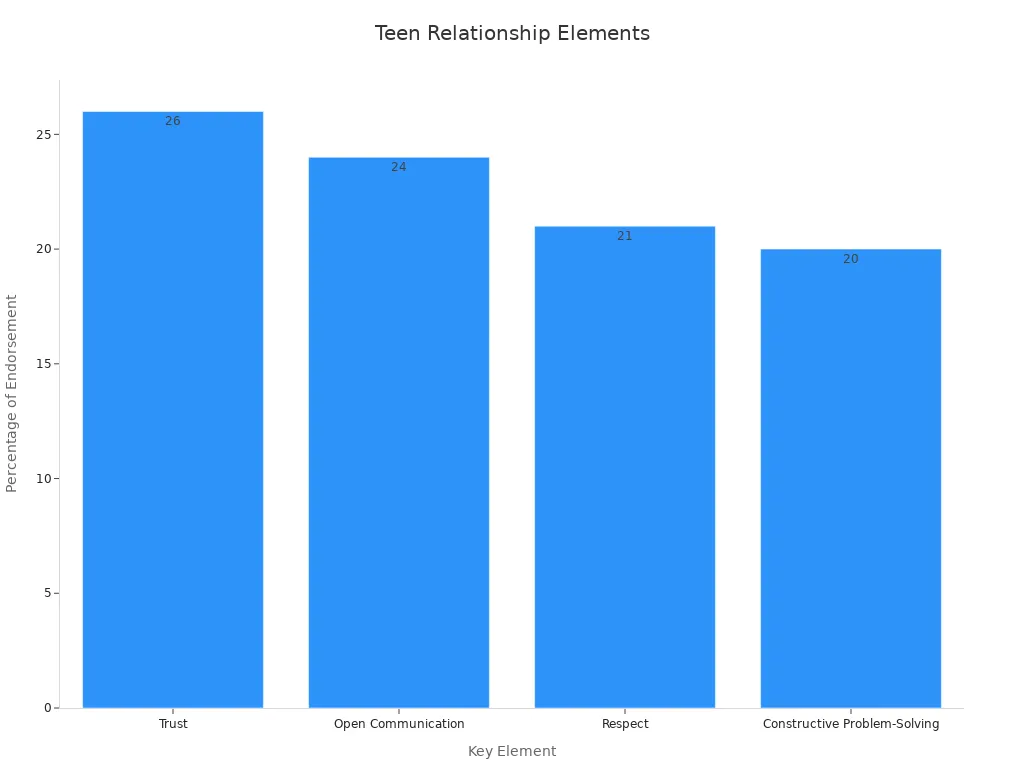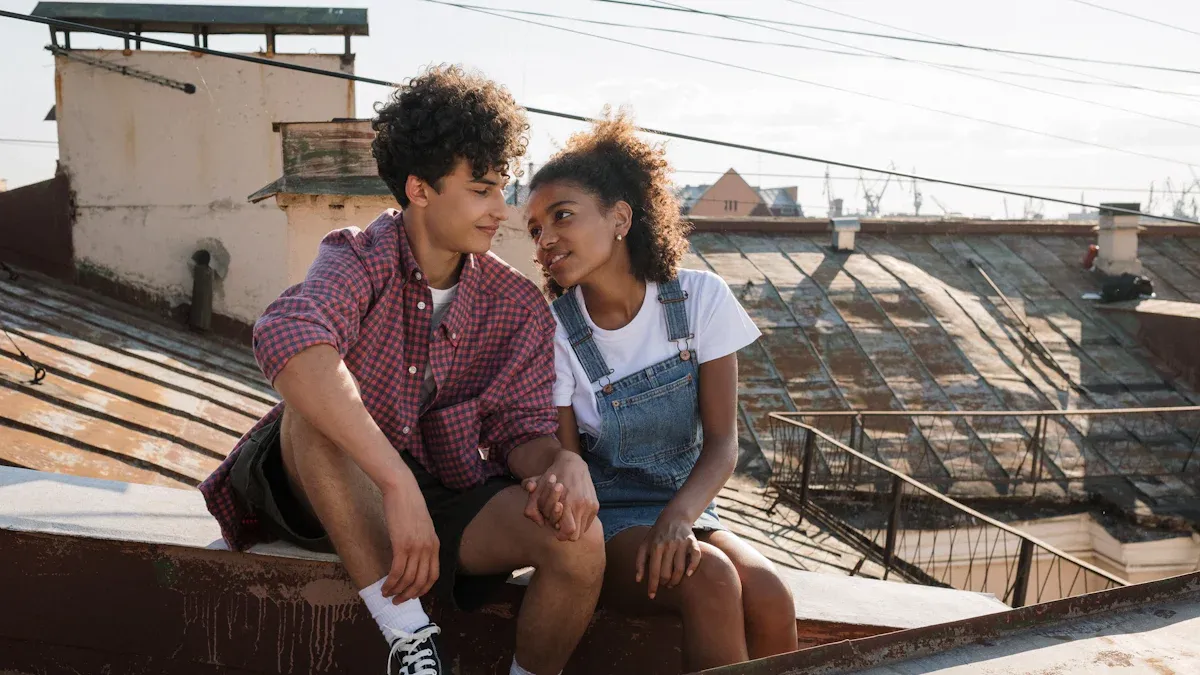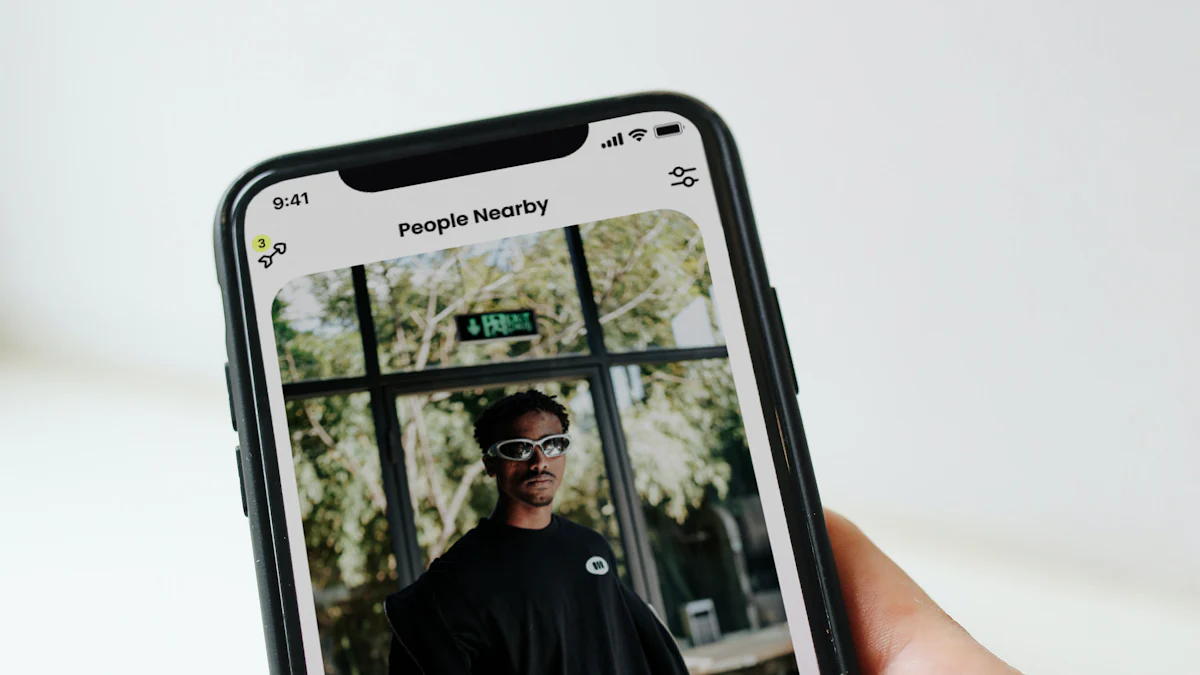If you want to know how to get a girlfriend as a teenager in 2025, start by focusing on yourself. Confidence grows when you take care of your body and mind. Build strong friendships, and treat everyone with respect. Good relationships need trust and patience. Remember, feeling happy with who you are makes everything easier.
Tip: Talk with your parents about dating rules and safety. They can help you make smart choices.
Key Takeaways
Build your self-confidence by caring for your body and mind. Use good hygiene, wear clothes that feel good, and practice self-care habits.
Make friends first and focus on trust and respect. Strong relationships often begin as friendships. These friendships can grow over time.
Join clubs, sports, or community events to meet new people. Practice social skills in fun and relaxed places.
Start conversations with simple greetings and questions. Listen carefully and always speak with respect and kindness.
Show real interest by asking open-ended questions. Find things you both like and support her goals and feelings.
Ask her out honestly and simply at a good time and place. Always respect her answer, whether it is yes or no.
Build healthy relationships with open communication. Respect boundaries and balance dating, school, and friendships.
Do not rush, try too hard, or ignore boundaries. Keep your friendships strong for support and balance.
Self-Confidence

Building self-confidence is one of the best things you can do for yourself, especially if you want to start a relationship. When you feel good about who you are, others notice. Confidence helps you talk to new people, try new things, and handle tough moments. Let’s break down how you can boost your self-confidence step by step.
Self-Care
Taking care of yourself is the first step. Self-care isn’t just about looking good—it’s about feeling good inside and out. When you make self-care a habit, you lower stress and feel more in control of your life. This makes it easier to connect with others and build strong relationships.
Hygiene
Good hygiene shows you respect yourself and those around you. Brush your teeth, shower regularly, and keep your hair neat. Clean clothes matter, too. When you feel fresh, you act more confident.
Tip: A simple routine—like washing your face every morning—can make a big difference in how you feel.
Dress Well
You don’t need expensive clothes to look good. Wear clean, comfortable outfits that fit your style. When you like what you wear, you stand taller and smile more.
Clothes that match your personality help you express yourself.
Feeling comfortable in your outfit makes social situations less stressful.
Self-care goes beyond looks. Regular activities like exercise, mindfulness, and creative hobbies help you manage stress and boost your mood.
These habits reduce anxiety and depression.
They help you bounce back from tough days.
Self-care gives you the energy to build friendships and try new things.
Positive Mindset
A positive mindset changes how you see yourself and others. It helps you handle challenges and makes it easier to meet new people.
Affirmations
Try saying positive things to yourself each day. For example, “I am a good friend,” or “I can handle new situations.”
Positive self-talk helps you feel stronger.
It keeps negative thoughts from taking over.
Realistic Goals
Set small, achievable goals. Maybe you want to join a club or talk to someone new at school. Celebrate each step forward.
Reaching goals builds confidence.
It shows you that progress is possible.
Supportive friendships and positive peer influence also shape how you act. When you spend time with people who encourage you, you feel more confident and willing to help others. This makes it easier to form healthy relationships.
Overcoming Rejection
Everyone faces rejection sometimes. What matters is how you respond.
Learn and Grow
If things don’t work out, ask yourself what you can learn. Maybe you need to listen more or try a different approach next time.
Learning from mistakes helps you grow.
It makes you stronger for future challenges.
Stay Resilient
Don’t let setbacks stop you. Keep trying, and remember that everyone has tough days.
Note: Self-care routines and supportive friends help you bounce back and stay positive, even when things get hard.
With self-confidence, you’ll find it easier to connect with others and build the kind of relationships you want.
How to Get a Girlfriend: Social Skills
Learning how to get a girlfriend as a teenager often starts with building your social skills. You don’t need to be the most popular person at school. You just need to know how to connect with others, make friends, and join in on activities. These steps help you grow your confidence and make it easier to meet someone special.
Make Friends First
Friendship is the best place to start if you want to know how to get a girlfriend. When you focus on making friends, you learn about trust, respect, and how to talk with others. Most strong relationships begin as friendships. You get to know someone without pressure, and you both feel more comfortable.
Build Trust
Trust grows when you show up for your friends and keep your promises. You listen, share, and support each other. Over time, trust makes your bond stronger. Many teens find that romance often starts with a solid friendship. In fact, research shows that most romantic relationships among young people begin after months of being friends. These friendships usually don’t start with romance in mind. They just grow naturally into something more.
Take Your Time
You don’t need to rush. Let your friendships develop at their own pace. When you take your time, you get to know the real person. You also give yourself space to see if you both want something more. A study found that teens often form romantic relationships within their friend groups. These relationships feel more stable because you already know and trust each other. Taking things slow helps you avoid awkwardness and keeps your friendships strong, even if romance doesn’t happen.
Tip: Focus on being a good friend first. You’ll build a strong foundation for any relationship.
Join Activities
Getting involved in activities is a great way to meet new people and practice your social skills. You don’t have to be an expert. Just try something that interests you.
Clubs and Sports
Clubs and sports teams bring people together. You work toward a common goal, share experiences, and have fun. You might join a chess club, drama group, or soccer team. These activities give you a chance to talk with others and make friends outside your usual circle.
Clubs help you find people who like the same things you do.
Sports teach teamwork and help you connect with others.
Community Events
Look for events in your neighborhood or school. Volunteering, festivals, and workshops are great places to meet people. You can help out at a local charity, join a clean-up day, or attend a school dance. These events make it easy to start conversations and show your friendly side.
Note: Trying new activities can feel scary at first, but you’ll get better at meeting people each time you try.
Meet New People
Expanding your social circle helps you learn how to get a girlfriend. The more people you meet, the more chances you have to find someone you connect with.
Friends of Friends
Sometimes, your friends can introduce you to new people. Hanging out in groups or going to parties gives you a chance to meet friends of friends. These connections often feel more relaxed because you already have something in common.
Ask your friends to invite you to group outings.
Be open to talking with people you haven’t met before.
Socialize Often
The more you practice, the easier it gets. Say hello to classmates, join group chats, or sit with someone new at lunch. You don’t have to be outgoing all the time. Small steps, like smiling or asking about someone’s day, can make a big difference.
😊 Remember: Every new person you meet is a chance to learn and grow.
Building your social skills takes time, but it’s a key part of how to get a girlfriend. Friendships give you a safe space to learn about yourself and others. Research shows that teens who start as friends often have stronger, longer-lasting relationships. So, focus on making friends, joining activities, and meeting new people. You’ll build the confidence and connections you need for a healthy relationship.
Talking to Girls
It can feel scary to talk to girls at first. But you get better with practice. Good talking skills help you connect and build trust. If you want a girlfriend, start by having real talks.
Start Conversations
You do not need fancy jokes or lines to talk. Simple greetings work best.
Simple Greetings
Saying “Hi” or “Hey, how’s it going?” is a good start. People feel better when someone uses a simple greeting. Studies show silence in groups makes people uneasy. Using easy words helps everyone relax. You make others feel welcome by saying hello.
Icebreakers
To keep talking, ask about something you both know. For example:
“Did you watch the game last night?”
“What do you think of this class?”
“Have you tried the new snack in the cafeteria?”
These questions help you move past awkward silences. They show you want to talk.
Listen Actively
Listening is just as important as talking. When you listen, you show respect and care.
Show Interest
Look at the person when they talk. Nod or smile to show you are listening. Active listening means you try to understand. You do not just wait for your turn. Research shows active listening builds trust and empathy. Teens who listen well make friends more easily. They also feel more confident.
Ask About Hobbies
Ask questions like, “What do you like to do after school?” or “What’s your favorite hobby?” These questions help you learn more about her. They keep the talk interesting. Listening without distractions helps you understand her better. It makes her feel important.
Tip: Active listening helps you build trust. It makes talks more meaningful.
Respectful Communication
Respect is the base of any healthy relationship. When you talk with respect, you build trust. You help the other person feel safe.
Avoid Pressure
Never push someone to talk or share more than they want. Give them space to open up when they are ready. Programs like Relationship Smarts PLUS teach that respect helps you set boundaries. It helps you spot red flags. Teens who learn these skills feel more confident and safe.
Read Cues
Watch body language and listen to tone. If she seems quiet or uncomfortable, change the topic or give her space. Respectful talking helps you notice these signs and be kind. Studies show trust grows when you use respectful words and actions.
Remember: Building trust takes time. Respectful talking is the key to strong, healthy connections.
Here are some ways good talking helps teens:
Teens who talk openly with parents and friends feel more confident.
Talking skills grow with practice and help from others.
If you want a girlfriend, start with simple talks. Listen well and always show respect. These skills help you connect and build trust. Trust is the heart of any good relationship.
Show Genuine Interest
Showing genuine interest helps you stand out. When you care about what someone says and does, you build trust and make real connections. Let’s look at how you can do this in simple ways.
Ask Questions
Open-Ended
Open-ended questions invite someone to share more about themselves. Instead of asking, “Did you have a good day?” try, “What was the best part of your day?” This type of question lets her talk about her feelings and experiences. You get to know her better, and she feels heard.
A recent survey found that open-ended questions help people share details and emotions about their social interactions. These questions encourage deeper conversations and help you both find what matters most to each other.
Listen Carefully
Listening is just as important as asking. When she answers, pay attention. Nod, smile, or say, “That sounds cool!” This shows you care about her words. Avoid checking your phone or looking away.
Tip: Good listeners make others feel valued. You build stronger connections when you listen with your full attention.
Find Common Ground
Shared Interests
Finding things you both enjoy makes spending time together more fun. Shared interests help you bond and avoid awkward moments.
Couples with similar interests often have fewer arguments and a stronger relationship.
One study found that 64% of couples with shared hobbies felt this helped their relationship succeed.
Even though this data comes from adults, it makes sense for teens too. When you like the same things, you have more to talk about and do together.
Respecting each other’s interests also matters. You don’t have to like everything she likes, but showing support goes a long way.
Try New Things
Sometimes, you might not know what you have in common. Be open to trying her favorite activities. Invite her to join you in something you enjoy. You might discover a new hobby together.
Trying new things together can help you both grow and create fun memories.
Be Supportive
Encourage Goals
Support her dreams and goals. Ask about what she wants to achieve, whether it’s a school project, a sport, or a creative hobby. Cheer her on and celebrate her wins.
Programs that teach teens about relationships show that encouragement and support help you both feel more confident and connected. When you support each other’s goals, you build trust and help each other grow.
Be There
Being supportive also means showing up when she needs you. Listen when she talks about her day. Offer help if she feels stressed.
Teens who get support from friends and family learn to ask for help and feel more independent as they grow up.
Supportive friendships in your teen years make it easier to build strong romantic relationships later.
😊 Remember: Showing genuine interest is about caring, listening, and being there. These small actions help you build a healthy, lasting connection.
Asking Her Out

So, you’ve built a friendship, shown you care, and now you want to ask her out. This step can feel scary, but you can do it! Let’s break it down so you feel ready.
Right Moment
Timing
Pick a time when you both feel relaxed. Maybe after school, during a walk, or when you’re hanging out. Avoid asking her out when she seems busy or stressed. You want her to feel comfortable and not rushed.
Tip: If you notice she’s having a tough day, wait for a better time. A calm moment helps both of you feel at ease.
Setting
Choose a place where you can talk privately, but not somewhere that feels too intense. A quiet spot at school, a park bench, or even a group hangout can work. You don’t need a fancy setting. What matters most is that you both feel safe and comfortable.
What to Say
Be Honest
Speak from your heart. You don’t need a perfect speech. Just tell her how you feel. For example, you might say, “I really like spending time with you. Would you like to go out with me sometime?” Honesty shows you respect her and value your friendship.
Keep It Simple
Simple words work best. You don’t have to use big words or long sentences. Try something like:
“I like you. Do you want to go out with me?”
“Would you like to hang out this weekend?”
😊 Remember: Being yourself is the best way to show you care.
Handle Responses
Respect No
Sometimes, she might say no. That’s okay. Respect her answer. Thank her for being honest. Respectful handling of her response shows maturity. Teens who respect boundaries and accept “no” build healthier relationships. You show you value yourself and her feelings.
Respect means listening to her answer, even if it’s not what you hoped.
Setting and respecting boundaries helps both of you feel safe.
Trust, honesty, and mutual respect are the foundation of healthy dating.
Stay Positive
If she says yes, celebrate! If she says no, stay positive. You took a brave step. Many teens say that handling rejection with respect helps them grow. You learn to cope, stay confident, and keep friendships strong. Healthy dating starts with respect and kindness, no matter the answer.
If you want to know how to get a girlfriend, remember that respect and honesty matter most. Every experience helps you learn and grow.
Healthy Relationships
Building a healthy relationship as a teen starts with trust, honesty, and understanding. You want to feel safe and respected, and you want your girlfriend to feel the same way. Let’s look at what makes a relationship strong and happy.
Key Element | Percentage of Teens Who Value It | What Teens Say |
|---|---|---|
Trust | 26% | “Loyalty, honesty, and trust are the three most important things in a relationship by far…” |
Open Communication | 24% | “Healthy relationships happen when two people are able to openly communicate…” |
Respect | 21% | “A good relationship is when both partners respect each other…” |
Problem-Solving | 20% | “Partners need to talk and provide a safe place… if they can fix what was causing hurt, then this is good.” |

Communicate
Good communication helps you and your girlfriend understand each other. It keeps your relationship strong and helps you solve problems together.
Share Feelings
Talk about how you feel. If you’re happy, excited, or even upset, let her know. Sharing feelings helps you both feel closer. Teens who talk openly with friends and family feel more confident and satisfied in their relationships. You can also talk to your parents about dating rules and safety. They want to help you make smart choices.
Resolve Issues
Every relationship has problems sometimes. When you disagree, stay calm and listen. Try to fix the problem together. Teens who solve problems by talking feel happier and more secure. You can use phrases like, “I feel upset when…” or “Can we talk about what happened?” This helps you both understand each other better.
Open communication with friends and parents helps you feel happier and more confident. It also helps you make better choices for your future.
Respect Boundaries
Boundaries are the rules you set for yourself and your relationship. They help you feel safe and respected.
Consent
Always ask before you do something new, like holding hands or hugging. If she says no, respect her answer. Consent means both people agree and feel comfortable. When you respect each other’s limits, you build trust and show you care.
Space
Everyone needs time alone sometimes. Give each other space to hang out with friends, focus on school, or just relax. Respecting space keeps your relationship healthy and balanced. It also helps you both grow as individuals.
Setting and respecting boundaries makes your relationship stronger and more secure.
Balance Life
Dating is fun, but you still have other important things in your life.
School and Dating
Keep up with your schoolwork and activities. Make time for homework, sports, and family. A healthy relationship should support your goals, not distract you from them.
Time Management
Plan your time so you can enjoy dating and still do well in school. Use a planner or set reminders if you need help. When you balance your life, you feel less stressed and more in control.
Remember, a healthy relationship helps you become your best self. Trust, honesty, and respect are the keys to making it last.
Mistakes to Avoid
Trying Too Hard
You might think you need to impress someone all the time to get a girlfriend. Maybe you try to act cool, buy gifts, or always agree with her. This can feel fake and exhausting. When you try too hard, you stop being yourself. People notice when you act differently just to get their attention. Real connections happen when you show your true self.
Trying too hard can also make things awkward. You might text too much or always want to hang out. This can make the other person feel pressured. Remember, you do not need to be perfect. Awkward moments and mistakes are normal. Real-life dating is not like the movies. It is okay to be nervous or not know what to say. Most teens feel this way at first.
Tip: Take a deep breath and relax. Let things happen naturally. You do not have to force a connection.
Ignoring Boundaries
Boundaries help everyone feel safe and respected. If you ignore someone’s boundaries, you can hurt their feelings or make them uncomfortable. For example, if she says she needs space, listen to her. If she does not want to talk about something, respect that. Pushing someone to share or do things before they are ready is never okay.
Healthy relationships need trust. You build trust by listening and respecting each other’s limits. When you ignore boundaries, you break that trust. This can end a friendship or relationship quickly. Always pay attention to how the other person feels. If you are not sure, just ask.
Respecting boundaries shows you care.
Listening helps you understand what the other person needs.
Giving space makes your relationship stronger.
Rushing Things
You might feel excited and want things to move fast. Maybe you want to call her your girlfriend right away or spend all your time together. Moving too quickly can make things stressful. It can also make the other person feel overwhelmed.
Experts say it is important to take your time. Let your friendship grow before you start dating. This helps you both feel comfortable and ready. Parents and mentors often remind teens not to rush. They want you to enjoy getting to know each other and learn important skills like communication and empathy.
Building a relationship takes time.
Spending time with friends and doing activities outside your relationship is healthy.
Waiting helps you avoid unhealthy dependency.
😊 Remember: Good things take time. Let your relationship grow at its own pace. You will both feel happier and more confident.
Neglecting Friends
When you start dating, it’s easy to get caught up in your new relationship. You might want to spend all your time with your girlfriend. You feel excited and happy. But if you forget about your friends, you can hurt your friendships without even noticing.
Your friends have been there for you before you started dating. They cheered you up when you felt down. They made you laugh and helped you through tough times. If you stop hanging out with them, they might feel left out or even replaced. Friendships need time and attention, just like any relationship.
Tip: Keep making plans with your friends, even when you’re dating. You don’t have to choose one over the other.
Here are some reasons why you should stay close to your friends:
Support System: Friends help you when things get tough. If you have a fight with your girlfriend or feel stressed, your friends can listen and give advice.
Balance: Spending time with different people keeps your life balanced. You get to enjoy different activities and conversations.
Fun: Friends bring fun and laughter. You can relax and be yourself around them.
Growth: Good friends help you grow. They challenge you, teach you new things, and help you see the world in new ways.
If you spend all your time with your girlfriend, you might miss out on these things. Your friends might stop inviting you to hang out. You could feel lonely if your relationship ends and you have no one else to talk to.
Try these simple ways to keep your friendships strong:
Schedule Friend Time: Set aside time each week to hang out with your friends. Play games, watch movies, or just talk.
Group Activities: Invite your girlfriend and friends to do things together. You can all have fun and get to know each other.
Stay in Touch: Send a quick text or message to check in with your friends. Ask how their day went or share something funny.
Celebrate Together: Remember your friends’ birthdays and special events. Show them you care.
😊 Remember: A healthy relationship doesn’t mean giving up your friends. You can have both! Keeping your friendships strong makes your life happier and your relationship healthier.
If you ever feel like you’re losing touch with your friends, talk to them. Say you miss hanging out and want to spend more time together. Real friends will understand and welcome you back. Balancing your relationship and friendships takes effort, but it’s worth it. You’ll feel more supported, confident, and happy.
You now know that making real friends starts with being confident, making friends, and showing respect. Go slow and learn from what happens. Healthy relationships take work and patience. Teens today care about honesty, trust, and talking clearly, both online and face-to-face.
Always be yourself
Help and support one another
Dating is different these days, but good relationships still need kindness and understanding. You can do it! 😊
FAQ
How do I know if a girl likes me?
Look for signs like smiling, making eye contact, or starting conversations with you. She might laugh at your jokes or want to spend time together. Every person is different, so pay attention to how she acts around you.
What should I do if I feel nervous talking to girls?
Take a deep breath and start with a simple “Hi.” Practice helps you feel more comfortable. Remember, everyone feels nervous sometimes. You can ask about her day or talk about something you both like.
Is it okay to ask someone out over text?
Yes, you can ask over text if you feel shy. Keep your message honest and simple. For example:Hey, I like you. Would you like to hang out sometime?
Face-to-face is great, but texting works too!
What if my parents don’t want me to date yet?
Talk with your parents about their rules. Ask them why they feel that way. Show them you respect their concerns. You can still make friends and learn about healthy relationships while you wait.
How do I handle rejection without feeling bad?
Rejection happens to everyone. It does not mean something is wrong with you. Thank her for being honest. Spend time with friends and do things you enjoy. You will feel better with time.
Can I have a girlfriend and still focus on school?
Yes! You can balance dating and school by managing your time. Use a planner or set reminders. Make sure you finish homework before hanging out. Good relationships support your goals.
What if my friends don’t like my girlfriend?
Listen to your friends’ reasons. Talk with them honestly. Sometimes, friends worry about losing you. Try to spend time with both your girlfriend and your friends. Healthy friendships and relationships can go together.
How do I keep a relationship healthy?
Communicate openly, respect each other’s boundaries, and support each other’s goals. Spend time together and apart. Trust and honesty help your relationship grow. Remember, healthy relationships make you feel happy and safe.


